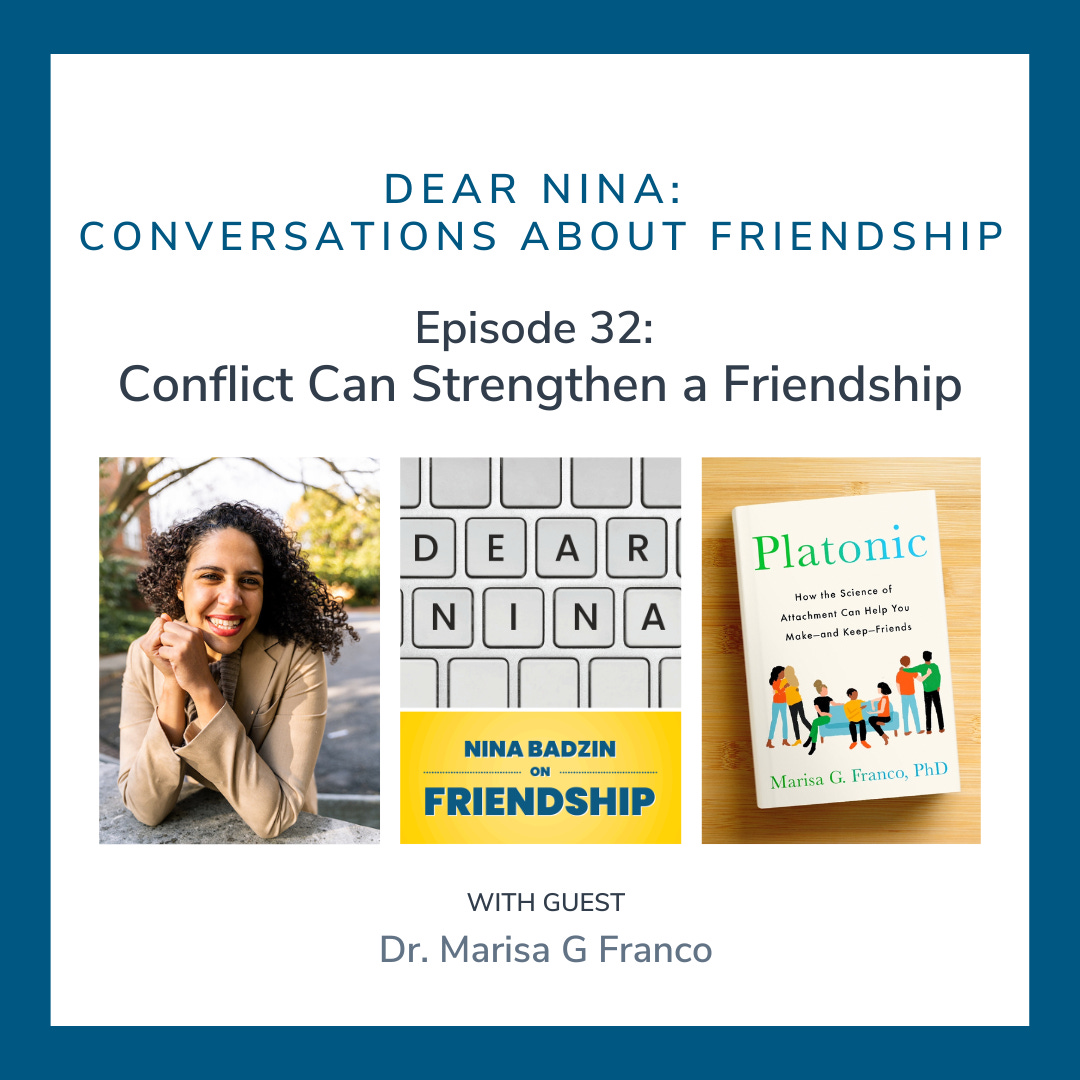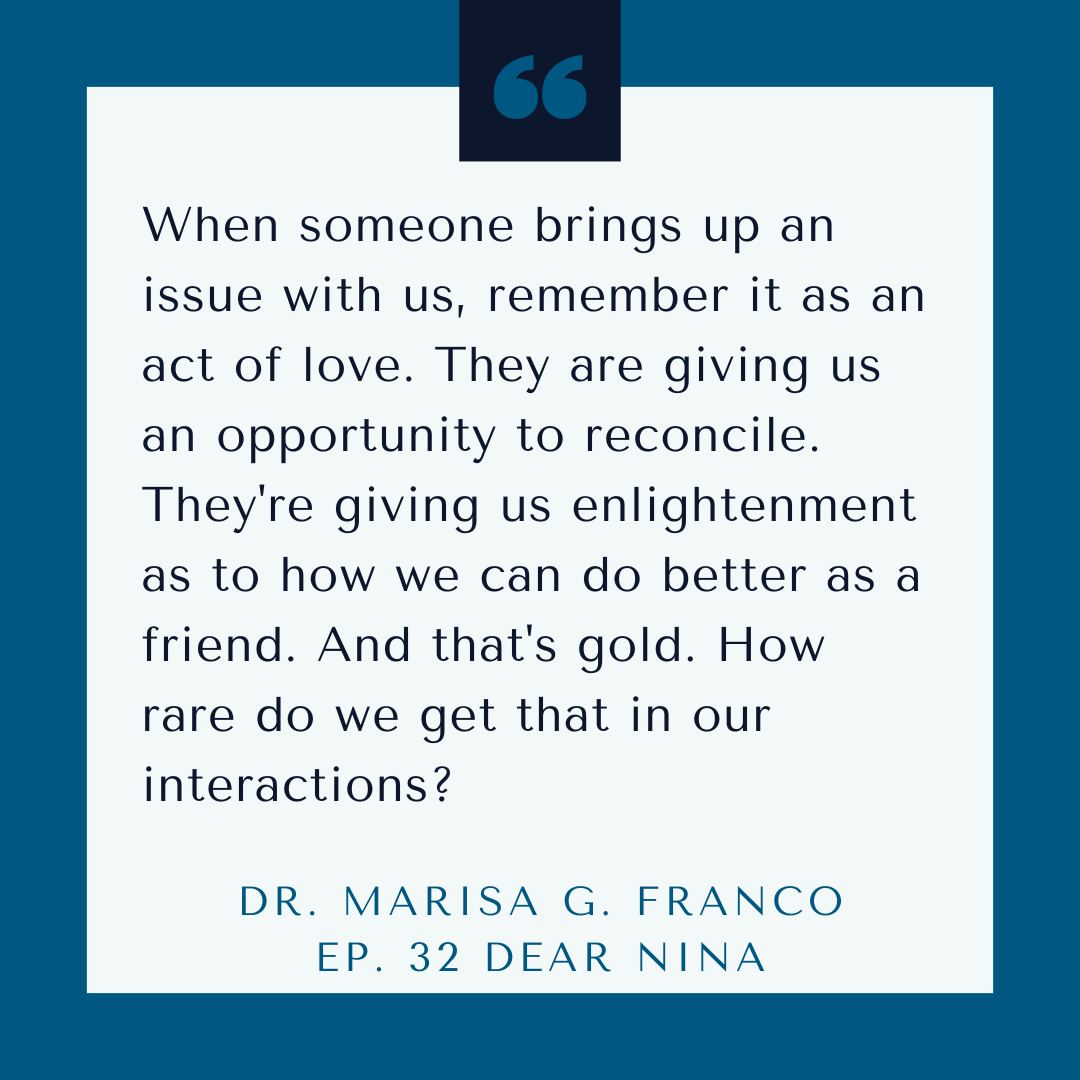Admit You're Upset With a Friend
Also Attachment Theory + Being Friends With People Who are Different From You
Let’s say three friends ignore your text asking if anyone wants to grab lunch this weekend. Do you assume they’re mad at you? Maybe they’re on some fabulous trip they failed to mention in the dozens of times you’ve seen them in the past six months?
Or, do you assume all three are busy and will get back to you when they can?
The way you answer that question is influenced by your attachment style in relationships, a concept explained throughly in Dr. Marisa G. Franco’s new book, Platonic: How the Science of Attachment Can Help You Make—and Keep—Friends. The book, available now, is a really interesting and clarifying read.
And Dr. Franco is the guest on Dear Nina this week!
We talked about attachment theory and the difference between the anxiously attached, avoidantly attached people, and the securely attached.
But most of the episode is focused on a particular chapter of Platonic that caught my attention about how expressing anger— rather than withdrawing—can strengthen a friendship.
Most people withdraw when they’re upset with friends.
I agree that admitting you’re upset can strengthen a friendship. In the times I’ve been direct about my disappointment, or when a friend has confronted me about theirs, my friends and I have always been closer because of our vulnerability and honesty.
THAT SAID, I don’t think every mistake merits a conversation. We also need to give our friends room to mess up, especially if we expect that room in return. I talked about that in a mini-episode last year called “Friends Make Mistakes.”
So yes, it can be tricky to know when it’s worth expressing our anger to friends and when it makes sense to let things go. I suppose one rule of thumb is this: Only decide to let things go if you’re REALLY GOING TO LET IT GO.
If you’re going to carry around your anger and resentment like a vile of poison that leaks out at random times, then you have not “let it go.” Instead, you’re poisoning yourself and probably the friendship, too.
I hope my episode with Dr. Franco will help you decide when to confront a friend and how to do it successfully.
RECENT PODCAST EPISODES
Episode 31: “Friends Who Are Different From You”
There have been a ton of articles on the topic of difference in friendship lately because of a new study about cross-class friendships— just one kind of difference possible in a friendship.
For this episode, I invited the fabulous friendship pair and podcast duo from HerNext Chapter, Stephanie Pierce and Julie Burton. The three of us had a fantastic conversation that covered a lot of ground, including asking yourself why you want friends who are different from you and what is a realistic and reasonable way to get there.
Episode 32: Conflict Can Strengthen a Friendship
Dr. Marisa G. Franco, author of Platonic, and I talked about how expressing anger can strengthen a friendship. Dr. Franco also gave tips for how conflict between friends can have a win-win outcome. We talked about attachment theory in friendship and more.
Reading Highlights
Most of my reading in the past few weeks has been short pieces from random books and websites to use in my fall writing groups.
I’d normally have the latest books to suggest in this spot, but for now, check out my full 2022 reading list with very short reviews.
TV Highlights
I finished season three of Never Have I Ever on Netflix, and I loved it so much. I found the adult story lines as amusing as the teen ones. I enjoyed it all. I even teared up in the last episode.
Articles and Episodes About Friendship I’ve Liked Lately
“The Trait That ‘Super Friends’ Have in Common” by Dr. Marisa G. Franco in The Atlantic. What can I say!? Dr. Franco is THE hot friendship researcher right now.
“Why You Always Think Friends Are Mad At You–Even When They’re Not” by Allie Volpe in The Washington Post
Esther Perel was on Dan Harris’s podcast Ten Percent Happier talking about how to keep friendships from imploding. It was excellent!
I’d love to point you towards my first subscriber-only “Dear Nina” letter and answer, which I titled: You Should be Friends With People You Like.
If you have a friendship dilemma you’d like to see answered in the newsletter or on the Dear Nina podcast, you can write it out here in this anonymous form. I will never know it was from you unless you decide to include an email address.








